2022 “Food & Wellness Future Forum”
December 5, 2022
3rd Food & Wellness Future Forum: “Eating for Optimal Health and Fitness—Tips for Practical, Delicious Nutrition”
On September 1, 2022, Ajinomoto Co., Inc. hosted the 3rd Food & Wellness Future Forum, part of its efforts to deepen mutual understanding through dialogue with consumers about food and health, dispel misinformation and misunderstandings about food, and realize a healthier and more prosperous society through better access to accurate and reliable health-related information.
This year’s forum, entitled “Eating for Optimal Health and Fitness—Tips for Practical, Delicious Nutrition,” drew an online audience of 1,300. Using live chat and instant polling, a panel that included Dr. Yuka Honda, an expert on women’s health, journalist Daisuke Furuta, and Ajinomoto Co., Inc. President and CEO Taro Fujie discussed practical, nutritionally balanced diets to help young Japanese women achieve optimal health and fitness. Joining the panel was Ms. Y, a social media influencer in her 20s. The discussion was conducted in Japanese.
Opening Remarks
Helping young women build healthier bodies through dialogue with consumers
The theme of this year’s Food & Wellness Future Forum—helping young women build healthier bodies through better nutrition—is a significant departure from the first two forums on food additives. Today we’re constantly being bombarded with nutritional information, much of it confusing or contradictory. This hasn’t changed during my lifetime and perhaps never will. That’s why I wanted to create this opportunity for us to discuss eating for optimal health and fitness, and get some expert advice on practical, delicious diets for achieving it.
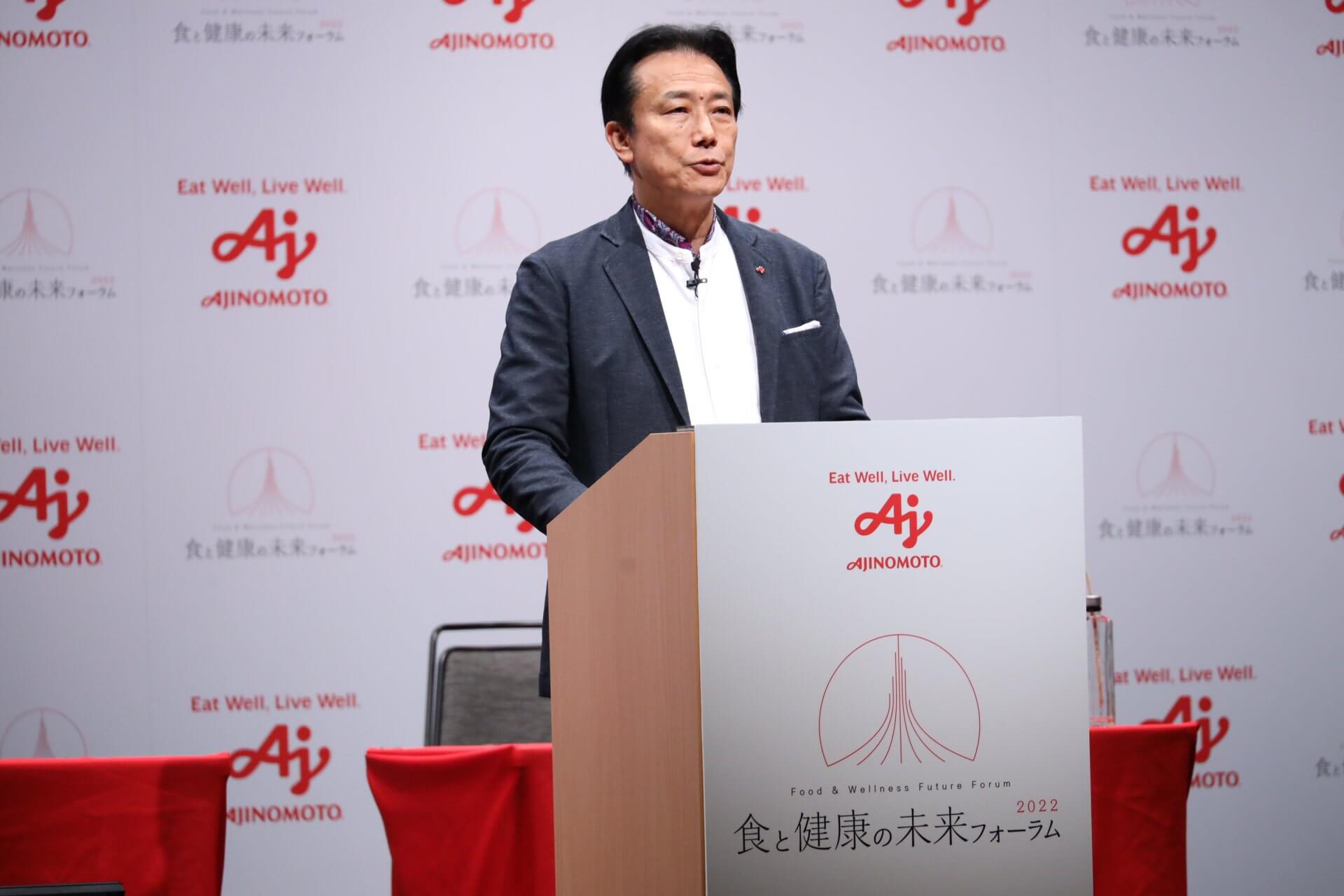
Taro Fujie
President & Chief Executive Officer (CEO)
Ajinomoto Co., Inc.
Session One: “What’s Your Ideal Body Type?”
Daisuke Furuta: President Fujie, what do you hope participants will take away from today’s discussion about eating for optimal health and fitness?
President Fujie: I believe good health is key to leading a fulfilled life and being able to do the things we all want to do, for men as well as women. However, many women, particularly in their 20s and 30s, aspire to be skinny or mistakenly think they’re overweight. This can lead to unbalanced eating habits that result in unhealthy weight gain, weight loss, or decreasing muscle mass.” These can all pose serious health risks to unborn children too. Therefore, I hope today’s discussion will help raise awareness, especially among young women, about the relationship between our bodies and health and nutrition.
Topic #1: Optimal health and fitness begin with diet
Furuta: Let’s start by looking at the results of our first audience poll about ideal body type.
■ Audience poll
Question #1: Which of these body shapes most closely corresponds to your ideal body type?
1) Slim with little muscle or fat; bust, waist, and hips roughly the same (I-shape): 2%.
2) Slim with a slightly narrower waist; some muscle on the legs and midriff (X-shape): 62%
3) Bust, waist, and hips roughly the same (I-shape): 1%
4) Narrower waist; bust and hips roughly the same (X-shape): 30%
5) Larger hips; bust and waist roughly the same (A-shape): 2%
6) Larger bust; hips and waist roughly the same (V-shape): 3%.
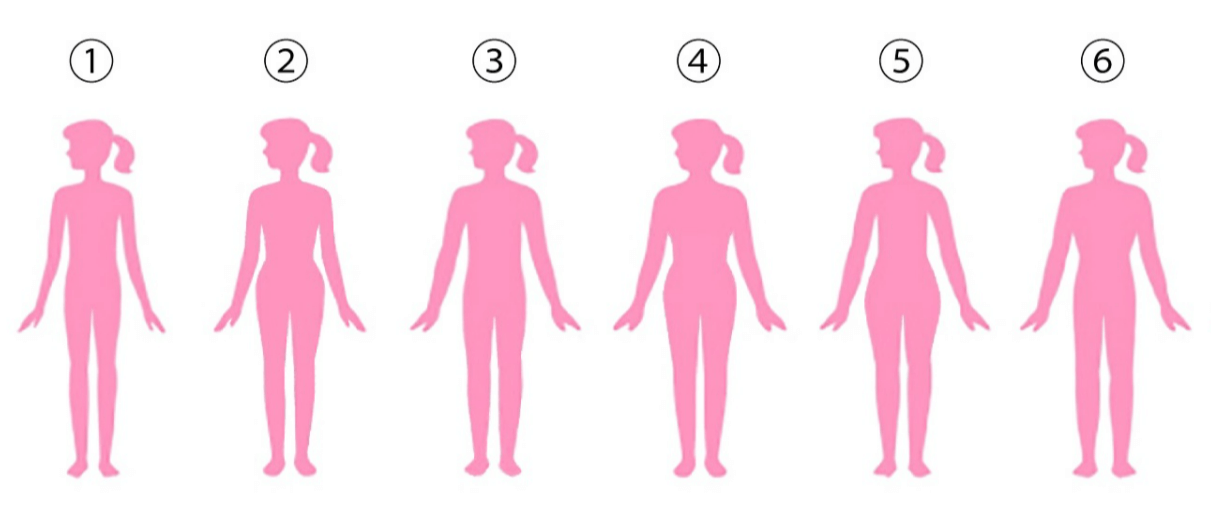
Furuta: As you can see, 62% of respondents chose the second body type, described as slim with a slightly narrower waist and some muscle on the legs and midriff. At 30%, the next most popular choice was the fourth body type, consisting of a narrower waist with bust and hips roughly the same. How about you, Ms. Y—which body type would you consider ideal?
Ms. Y: Personally, I think I’d also choose the second body type—a slim, more muscular build.
Dr. Yuka Honda: Although over 60% of respondents in our poll chose the second body type, this is very close to what one could call skinny. Based on our survey, this body type corresponds to a BMI1 of 19.5 kg/m2. While 19.5 is within the normal weight range, a BMI of 22 is considered healthiest, statistically speaking, in terms of lowering one’s chances of becoming ill. This corresponds to a body type slightly larger than the largest shown here. Our second body type would be considered borderline underweight, meaning if you mistakenly were to undereat, you’d be in danger of falling below 18.5 kg/m2, which is considered underweight.
1BMI (body mass index) is an international measure of body size, defined as weight (in kilograms) divided by height (in meters) squared. The World Health Organization classifies a BMI value below 18.5 as underweight; 18.5 to 25 as healthy weight; and above 25 as overweight.
Furuta: In other words, to be healthy, one should choose a body type larger than all those shown here. According to statistics, more than 40% of Japanese women in their 20s and 30s have a BMI of 20 kg/m2 or less, which is borderline underweight. In a nationwide survey which the Ajinomoto Group conducted last month of 1,000 Japanese women aged 18 to 39, the average BMI of respondents was 20.3 kg/m2, and the average BMI they aspired to was just 18.6. Would you say this is a dangerously low level, Dr. Honda?
Honda: A BMI above 18.5 is considered normal weight, so 18.6 is just within the target range. But given that we all experience fluctuations in weight throughout the day, some people could fall below 18.5 at times. Being underweight can greatly impact one’s hair, skin, and nail health, lead to irregular menstruation, and increase one’s future risk of infertility and osteoporosis. It can also affect our daily physical condition. For optimal health and fitness, therefore, diet is as important as exercise and sleep, and one should aim for a BMI of 20 or higher, corresponding to our fourth body type.
Ms. Y: I never really had the desire to be skinny, but I’ve always felt a bit insecure because everyone around me was extremely thin. I think that’s why I chose the second body type. But listening to Dr. Honda, I’m relieved to know my current body type is healthy.
Furuta: I suspect that many in the audience who chose our second body type did so believing it’s the ideal body type, based on messages from TV and social medial. The Ajinomoto Group’s survey of 1,000 Japanese women aged 18 to 39 showed that nearly half of those who expressed a desire to lose weight got their nutritional information from social media. Now, I’d like to ask our audience what they’ve done in the past or now are doing to lose weight, and whether it’s worked. I see in the chat that many of you have tried saunas, a very popular diet method these days, and home workouts.
Ms. Y: I tried various diets starting in junior high school. After beginning my career, I even tried a diet where I skipped meals. But I always regained any weight I lost right away, so I’ve given up on those sorts of extreme diets. Now I exercise on my own when I have time by watching strength training videos on social media.
Furuta: Like Ms. Y, I see from the chat that our audience seems equally divided between those who exercise to lose weight and those who restrict their diet. President Fujie, what are your views on this?
Fujie: It seems people are searching for what works best for them based on their own lifestyle or personal beliefs. So I think it’d be great if we could exchange ideas about how to cook and eat in ways that better fulfill our own unique nutritional needs.
Honda: I’m surprised to hear people say that they lost weight by going to a sauna or skipping meals. To lose one kilogram of body fat, one needs to expend 7,000 kcal, so if you want to lose that much weight in one week, you’d have to do the equivalent of running three marathons. Losing weight in a short period of time using saunas or cutting back on food is simply reducing water weight and muscle mass at the same time. You should be aware that when you return to your original weight, you’ll have less muscle mass than before and proportionately more body fat.
Topic #2: Low-calorie and poorly balanced diets can lead to health issues
Furuta: According to data from the Ajinomoto Group survey of 1,000 women aged 18 to 39, 44.7%, or nearly half of respondents, cited “fatigue” as a daily health issue. Other common complaints, all in the 35–40% range, included “neck, back, or joint pain,” “irritability,” “skin problems,” and “headaches,” with nearly 90% of respondents reporting at least one type of daily health issue.
Ms. Y: Personally, I basically feel tired most of the time, which could be related to hormonal imbalance, an issue unique to women. My body feels the most tired when I’m eating whatever I want, whereas I feel really good when I’m on eating with nutritional balance in mind. So finding a practical diet that suits me is the most important thing.
Honda: We know that women in their 20s and 30s, who have high levels of female hormones, can still experience menopause-like symptoms such as fatigue, irritability, and neck pain. These may be caused by dietary factors such as caloric and nutritional deficiencies or nutritional imbalance. Research also shows that Japanese women who restrict their diet and have low muscle mass, with a BMI below 18.5, are more likely to develop diabetes, so it’s very important to build muscle mass and eat well.
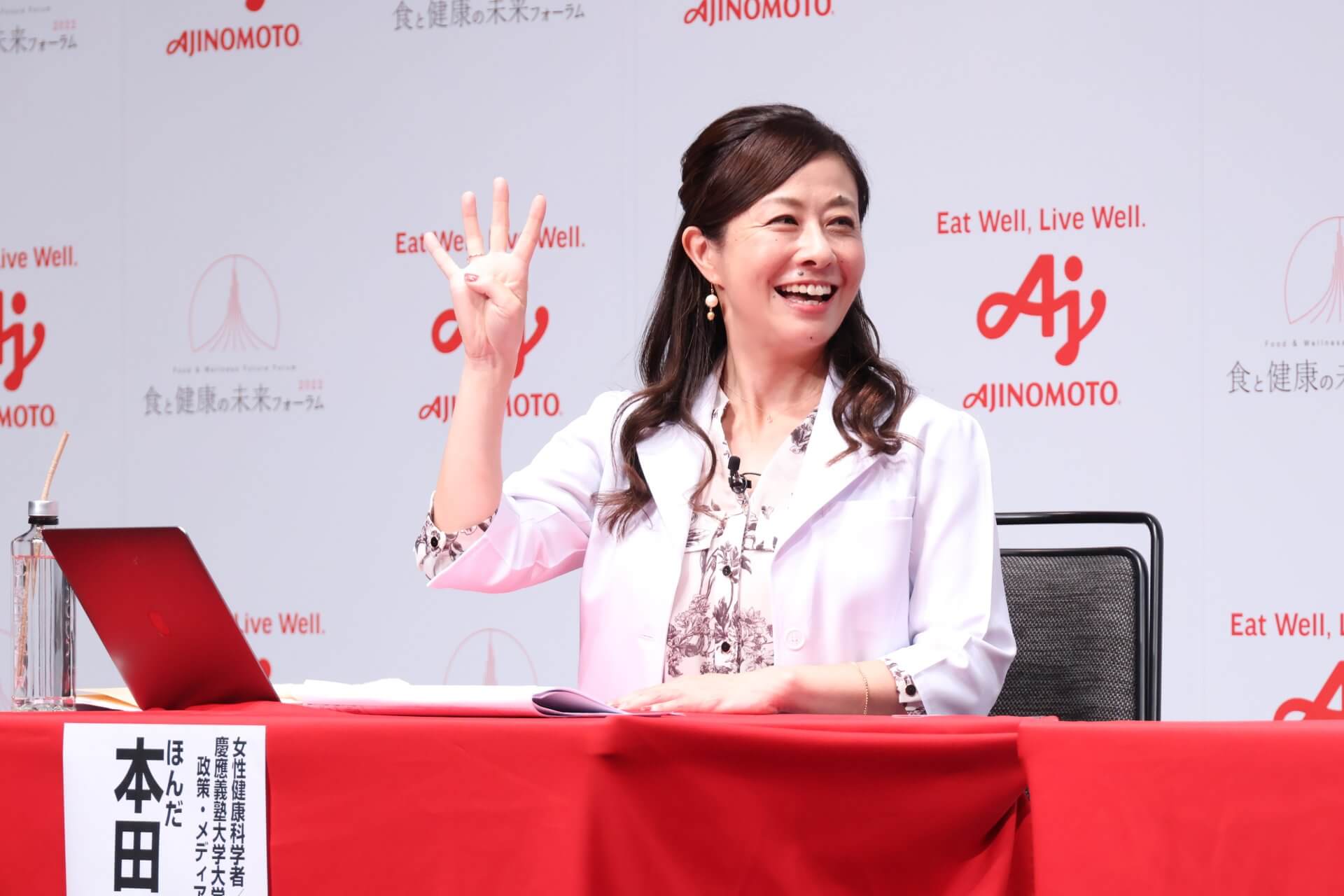
Dr. Yuka Honda
Ph.D., women's health researcher
Associate Professor, Graduate School of Media and Governance, Keio University
In addition, in the Ajinomoto Group’s survey of 1,000 women aged 18 to 39, a significant number of respondents with a BMI of less than 18.5, categorized as “underweight,” indicated that they skip breakfast, which has a greater impact than skipping any other daily meal. Irrespective of BMI or body type, women who skip breakfast are much more likely to experience fatigue as well as symptoms like neck and back pain, difficulty sleeping, hot flashes, headache, nausea, dizziness or vertigo, and constipation. Eating breakfast helps reset the body’s internal clock, and skipping it disrupts this daily rhythm. The simple caloric deficiency caused by skipping breakfast can lead to these common ailments.
Eating breakfast, and being aware of vegetable and protein intake, is therefore very important. Quantity is also important. Women in their 20s need about 2,000 kcal per day, but many young women are not consuming enough. When we’re young, it may not seem like a big deal if we snack throughout the day instead of eating proper meals, as we probably won’t see any negative effects immediately. However, nutritional deficiencies and imbalances can show up later in life.
Furuta: You’re saying an accumulation of negative factors in youth can have a big impact down the road. I think this is an important takeaway.
Session Two: Building the Body That’s Right for You
Topic #3: How to eat well every day to achieve a healthy body
Furuta: Dr. Honda, what do you mean by eating a well-balanced diet?
Honda: The body consists of five basic components: fat, muscle, minerals, water, and carbohydrates. These are all provided by the nutrients we get from food, which give us energy for our daily activities and are the building blocks of a healthy body, including our hair, nails, skin, and figure. Eating well means giving our body what it needs. A well-balanced meal includes a staple food, main dish, and two or more side dishes of fruits and vegetables. If it’s difficult to think aout nutritional balance at every meal, try this fun tip: next time you go grocery shopping, fill your basket with five tastes—sweet, sour, salty, bitter, and umami—seven colors of vegetables, plus meat, dairy and seafood. And remember, a healthy body is composed not only of muscle but also contains adequate body fat, so make sure to eat unsaturated, or so-called good fats, as well as protein.
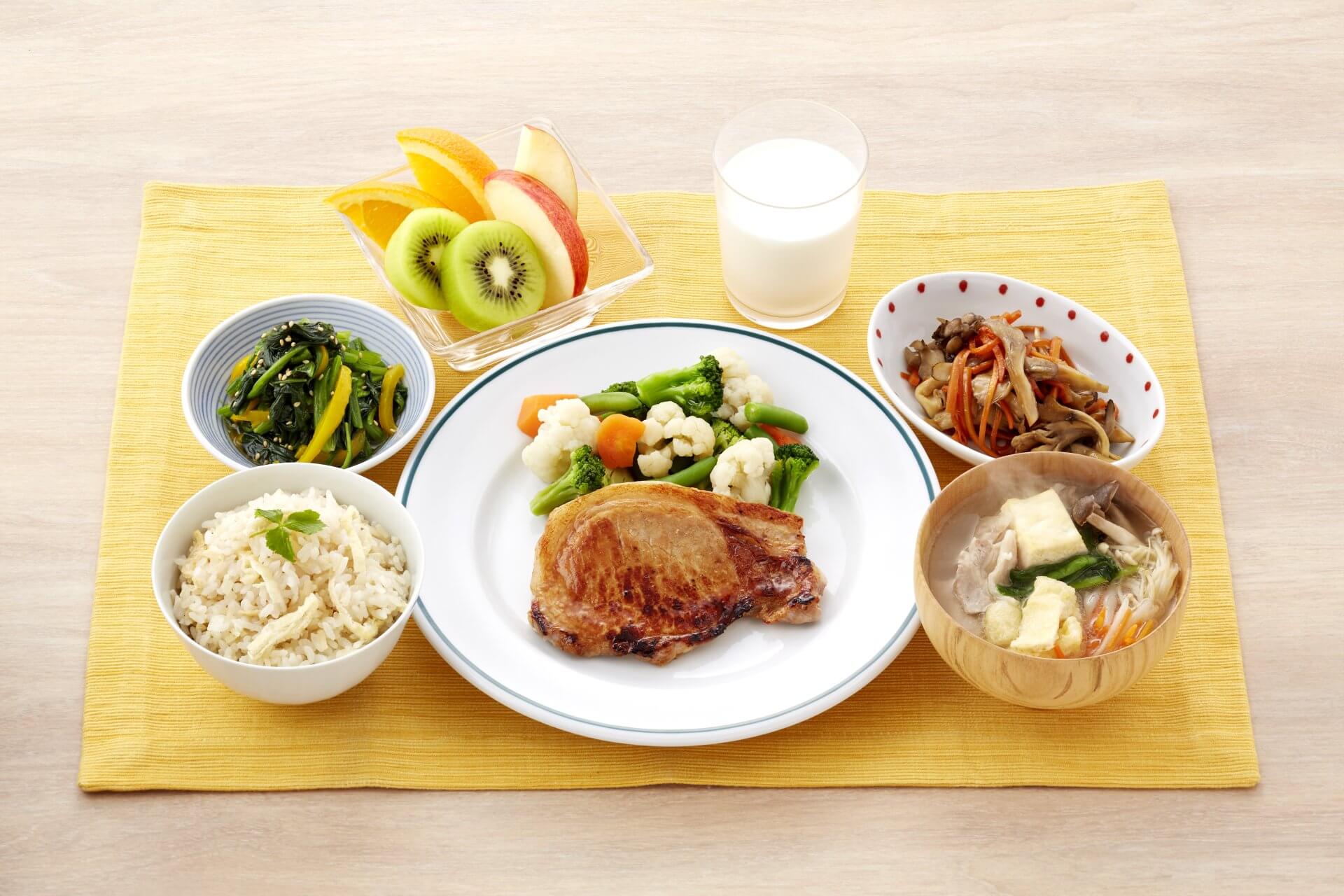
The example of a well-balanced meal
Furuta: In the chat, a mother with young children says she doesn’t have time to think about nutritional balance. Do you have any suggestions for quick, nutritious meals?
Honda: Try starting with something doable, like miso soup with lots of vegetables and a raw egg, or leftovers on toast with grilled cheese.
Ms. Y: I was surprised to hear that an adult woman needs to eat 1.2 kg of food per day, which seems like a lot, plus it has to be balanced. Dr. Honda’s suggestion about focusing on taste, color and variety seems much easier. I think I’ll try it next time I go shopping.
Video messages from experts in body building
Video message from Shuichi James Nakano, physical trainer, on how to build a body that burns fat efficiently
To build a body that burns fat, it’s important to build muscle, which is made of protein. To build muscle from protein, carbohydrates are required. Lipids, vitamins, and minerals are also essential. Eating 1,000 kcal per day isn’t enough to ensure a well-balanced intake of these nutrients. With good nutritional balance, you can build muscle on a 2,000 kcal per day diet, without having to worry about regaining fat mass. Also, since our lower body accounts for 70% of our total muscle mass, if you don’t like to work out, try taking the stairs instead of the elevator every day.
Video message from Dr. Erika Shinohara, registered dietitian, on eating a well-balanced diet for optimal health and fitness
The key to eating well-balanced meals is having a staple food, main dish, and side dish. It’s also important to supplement these meals every day by consuming dairy products and fruits so you get all the nutrients your body needs. But even if you eat a well-balanced diet, if you skip breakfast, you won’t be getting sufficient nutrients. You can easily add a prepared salad, hearty soup, or a boiled egg to your regular meal. Also, if you’re not in the habit of eating breakfast, start with something simple, like a glass of milk or soy milk. Once you get used to that, try a banana or some cereal. As you slowly increase your number of balanced meals, and the number of days when you eat balanced meals, you’ll find it becomes easier and easier.
Ms. Y: I usually cook dinner myself, but for breakfast and lunch I tend to just grab whatever’s convenient. Since my work schedule is irregular, I like the idea of balancing out my diet with a prepared, store-bought dish, so I think I’ll give it a try. Also, I usually have something in the fridge that I’ve cooked beforehand for when I’m too busy to cook much for dinner.
Furuta: I hope everyone will try out some of those suggestions whichever way works best for you. Now let’s see how our audience plans to eat well-balanced meals every day.
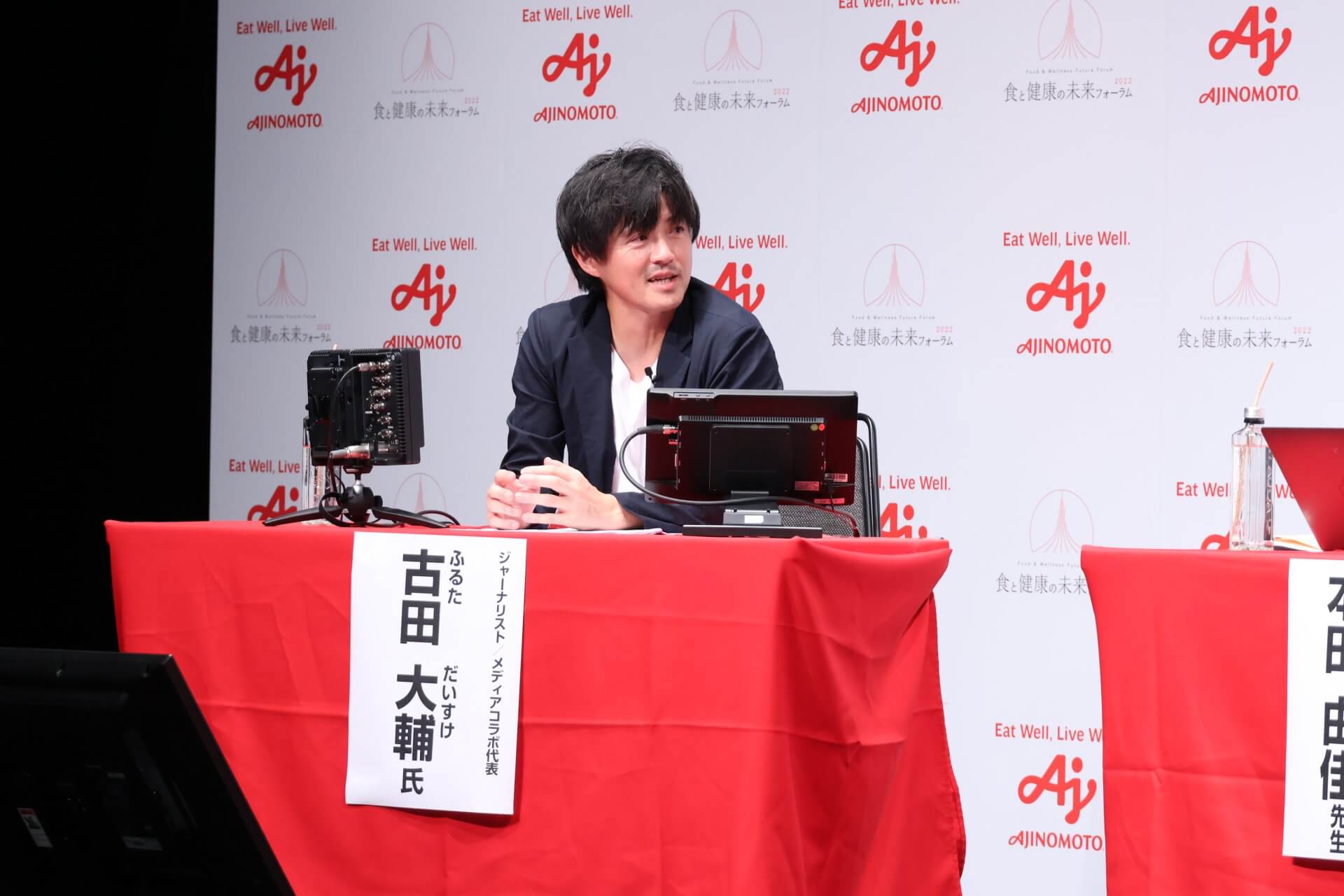
Daisuke Furuta
Journalist
Sample comments from the online chat:
“For a more balanced diet, I’m going to try increasing the number of dishes I eat at each meal.”
“I find it hard to cook because I live alone, so I’m going to start supplementing my meals with prepared foods.”
“When I cook, I always include a colorful variety of foods.”
Furuta: Now, let’s review what we’ve learned so far:
1) Eating a well-balanced diet is the shortest route to achieving optimal health and fitness.
2) If you give your body the nutrients it needs, you can build the body you want.
3) Start with what is doable for you over the long term, like eating a nutritious breakfast.
Has what you’ve heard so far made you think differently about eating breakfast, Ms. Y?
Ms. Y: These past few months, I’ve finally started eating a proper breakfast because I’m leading a much more regular lifestyle. When I eat breakfast, I’m also able to eat a better lunch, and I enjoy eating more than I did before.
Q&A
Audience question:
I work night shifts and my mealtimes are irregular. How can I eat a balanced diet?
Honda: Night shift workers should eat some form of protein every three hours. After your shift, it’s not good to go without food, but if you suddenly eat something sweet, your blood glucose will rise rapidly, so it’s better to have something plain like a bowl of porridge or vegetable soup, then eat your meals as you would normally. As a snack during your shift, I recommend something like protein-enriched gelatin or bananas and soy milk.
Furuta: In a poll before the event, 66.4% of our online audience said they either currently eat three meals a day or intend to do so in future. We took the same poll just now, and that number rose to 89%. What do you all think of these results?
Ms. Y: I’m glad the audience has gotten the message about the importance of eating a good breakfast. The main thing is not only eating well-balanced meals but enjoying eating too. Personally, I want to think more about cooking with a colorful variety of ingredients. I also realized that I haven’t been eating enough staple foods like bread and rice. This has been a good opportunity to reflect on my eating habits.
Fujie: A number of key points have been made, foremost the importance of eating a good breakfast, eating a balanced diet, and enjoying what you eat.
Audience question:
Does anything other than BMI determine one’s infertility risk?
Honda: Research shows that the risk of infertility increases when body fat percentage falls below 22%. Even if your BMI is in the normal weight range of 18.5 to 24.9 kg/m2, a body fat percentage below 17% puts you at greater risk of bone fractures and missed menstrual periods. One should aim for a BMI of 20 to 23.9, a body fat percentage of 20% to 24%, and above average muscle mass. As we age, we tend to lose muscle mass around the thighs, increasing the risk of becoming bedridden when we’re old. So we also need to think about what could happen to us in 30 years.
Ms. Y: I was surprised to learn of the risk of thigh slimming diets and exercises, which are very popular with young people these days.
After this, the discussion continued for some time as the panel answered more questions from the online audience.
■ Audience poll
Question #5: Will you eat three meals a day in future?
1. I will eat/am eating three meals a day: 89%
2. Not sure: 11%
3. Probably not: 1%
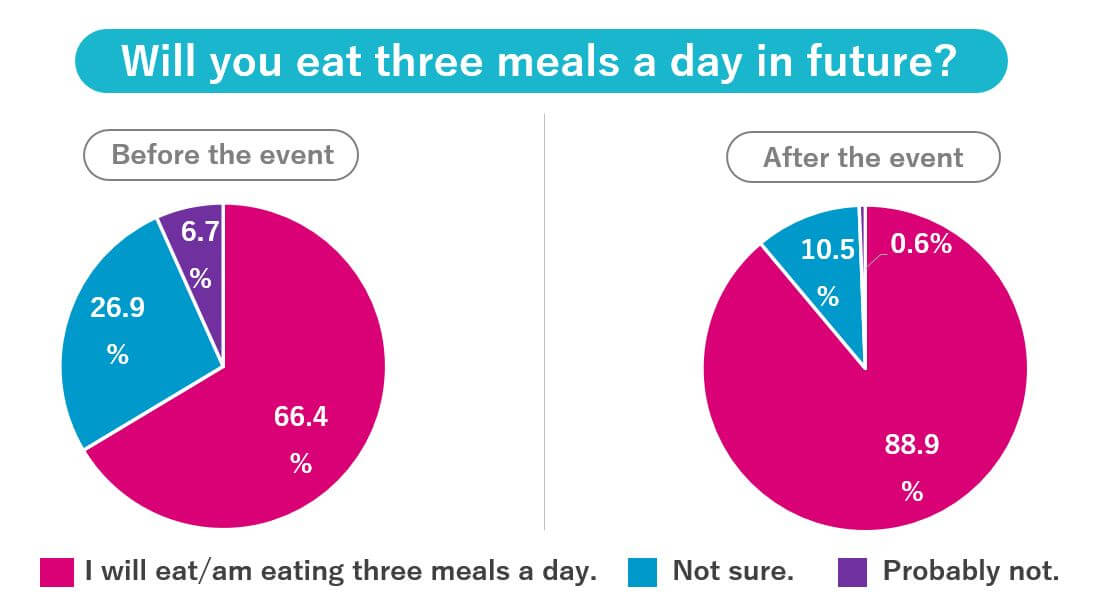
Question #6: Has this event raised your awareness of the need to eat a well-balanced diet?
- Yes: 76%
- Not sure: 19%
- No: 5%
Question #7: What are the key takeaways for you of today’s event?
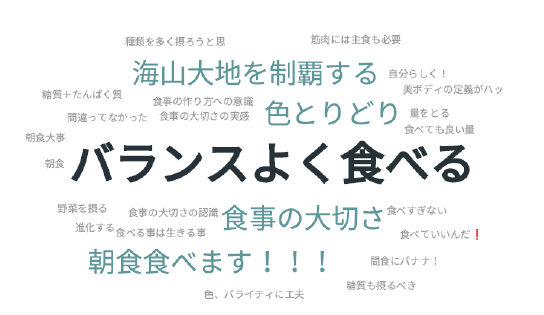
Common audience responses included “Eat a balanced diet”, “Regular meals are important”, “Eat seven colors of vegetables,” “Eat meat, dairy and seafood”, “Don’t skip breakfast”.
Summary
Honda: Today we’ve mainly been discussing how to eat for optimal health and fitness, but exercise and sleep are as important as diet for building a better body. Breakfast is also key to improving our sleep quality. In the morning, eating a well-balanced meal featuring protein and getting direct sunlight will help reset your body’s internal clock. If you’re one of today’s many twenty- or thirty-somethings who aren’t in such good physical condition, I encourage you to take a look at how you can improve your daily eating habits from the point of view of nutritional balance.
Ms. Y: I’ll probably always admire women with slim figures, but I’ve come to realize that it’s not the body type I should aspire to. Today’s forum has been an opportunity for me to reexamine my diet from the perspective of health and the long life ahead of me. I also realized that when posting on social media, I should always try to convey important and accurate information. I’ve learned many things today that I want to put into practice right away, so from now on I’ll try to look at food and nutrition in a different way.
Fujie: The free exchange of views we’ve had today has reminded me we should enjoy eating more and not worry about our weight so much—if we do that, then a balanced diet and better health should naturally follow. I remember returning to Japan after living overseas for 13 years in three different countries and being struck by how extremely thin young Japanese women had become. I know many of you joining us today feel the pressure in Japan to become thin, even at the expense of your health, but let’s put these expectations behind us, and, little by little, begin practicing what has been discussed here today. As president of Ajinomoto Co., Inc., I’d be delighted to help you all to take that first step. Following extreme diets or unreasonably restricting your food intake is bad for both your physical and mental health. My company’s goal is to do everything we can to help as many people as possible enjoy better health and happiness.
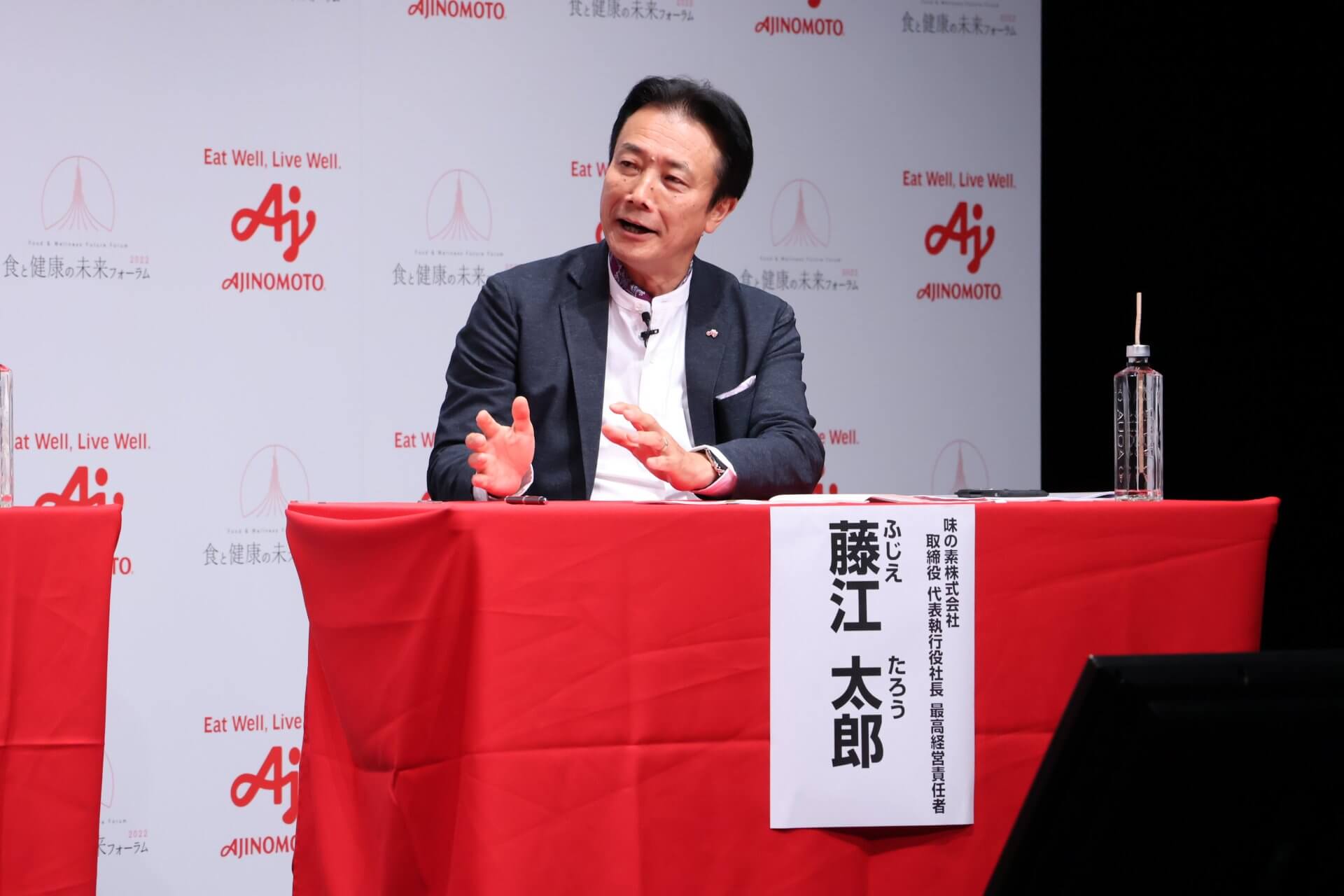
■ Final audience poll
Question #8: In a few words, please describe your feelings about today’s event.
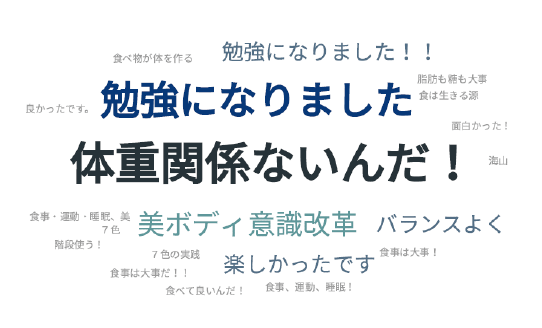
Common audience responses included “It’s not all about weight”, “I learned a lot”, “It changed my body image”, “It was well-balanced”, and “I had fun”.
Thanks to the active participation of the audience of 1,300—who shared a steady stream of opinions, comments, and questions in the chat for nearly two hours—the 3rd Food & Wellness Future Forum ended on a high note.
Event Overview
Name: The 3rd Food & Wellness Future Forum
Title: “Eating for Optimal Health and Fitness—Tips for Practical, Delicious Nutrition”
Date: September 1, 2022 (online)
Participants
Moderator: Mr. Daisuke Furuta, journalist
Panelists:
Guest: Ms.Y (a social media influencer in the age of 20s)
Dr. Yuka Honda (Ph.D., women’s health researcher and Associate Professor, Graduate School of Media and Governance, Keio University)
Mr. Taro Fujie (President and CEO, Ajinomoto Co., Inc.)
Program
Session One: “What’s Your Ideal Body Type?”
• Optimal health and fitness begin with diet.
• Low-calorie and poorly balanced diets can lead to health issues.
Session Two: “Eating to Build Your Ideal Body”
• How to eat well every day to achieve a healthy body.
Closing Remarks: Ajinomoto Co., Inc. President & CEO Taro Fujie
Note 1: As this was a live event, some of the statements may reflect the participants’ personal opinions or contain ambiguous language.
Note 2: This report is a summary. Some brief supplementary explanations have been added and the order of statements rearranged to improve the flow of the discussion.
